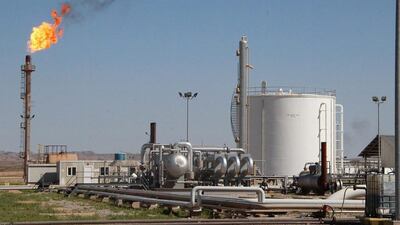A London court, ruling in a dispute that dragged on for six years, has ordered the Kurdistan Regional Government in Iraq to pay US$1.98 billion to a consortium including Dana Gas.
A tribunal of the London Court of International Arbitration directed that the payment be made within 28 days. The judgement is final, binding and internationally enforceable, Dana said in a statement to the Abu Dhabi stock exchange.
If enforced, the award could have a major impact on the fortunes of Dana and other natural gas firms operating in Iraqi Kurdistan, as well as on the KRG, whose finances have been strained by its fight against Islamic State militants.
There was no immediate comment from the KRG.
In 2007, Kurdistan awarded Dana and the UAE's Crescent Petroleum a 25-year deal to develop the Khor Mor and Chemchamal gas fields. Austria's OMV and Hungary's MOL subsequently each took 10 per cent of the venture.
But the project became entangled in allegations that the consortium had been underpaid for condensate and liquefied petroleum gas products supplied from Khor Mor.
The consortium filed an international arbitration case over the dispute in London in October 2013. Legal action has also taken place in other courts; last week, Dana said the British High Court had ordered the KRG to pay the consortium $100m within 14 days.
“The clear rights of the consortium to both fields for long-term development and production, including title, and of course payment, have now been confirmed beyond any doubt,” Majid Jafar, chief executive of Crescent and managing director of Dana’s board, said on Sunday.
“After almost seven years delay caused by this unnecessary dispute, we hope that with respect for contract we will now finally be able to move forward and prevent further losses for all sides by developing these world class resources as originally envisaged for the benefit of Kurdistan and all of Iraq, as well as the wider region.”
Dana said it had further, substantial damage claims for wrongfully delayed development of the gas fields that would be heard in 2016, along with remaining counter-claims of the KRG.
It said the consortium had so far invested over $1.2bn in the project and produced the equivalent of over 150 million barrels of gas and petroleum liquids.
business@thenational.ae
Follow The National's Business section on Twitter

